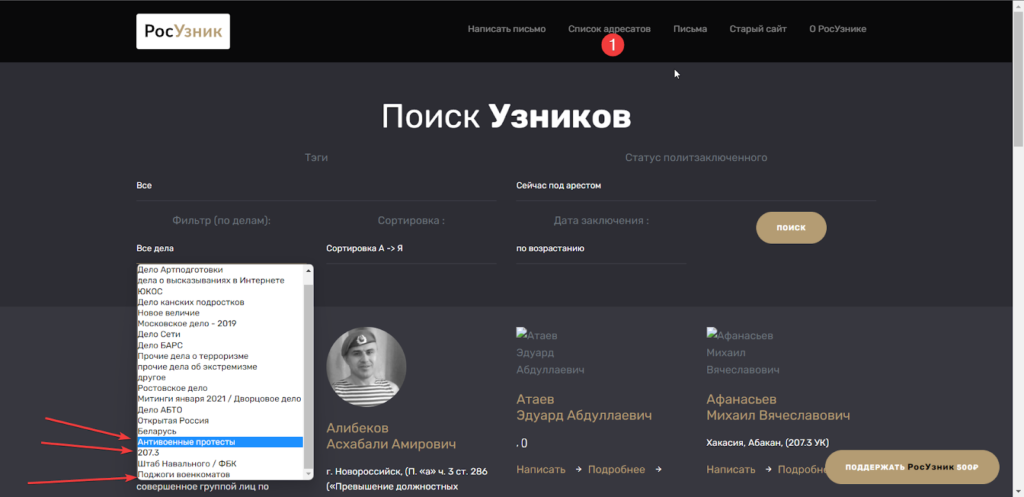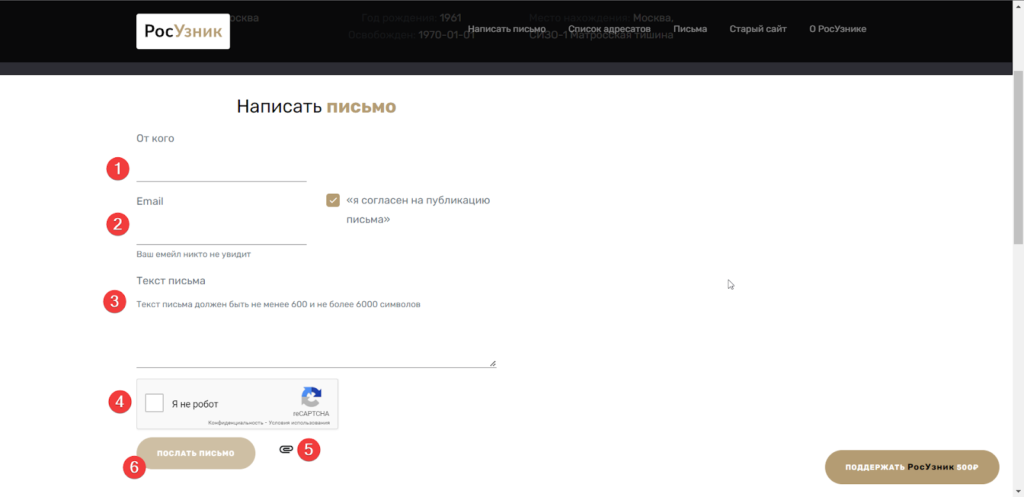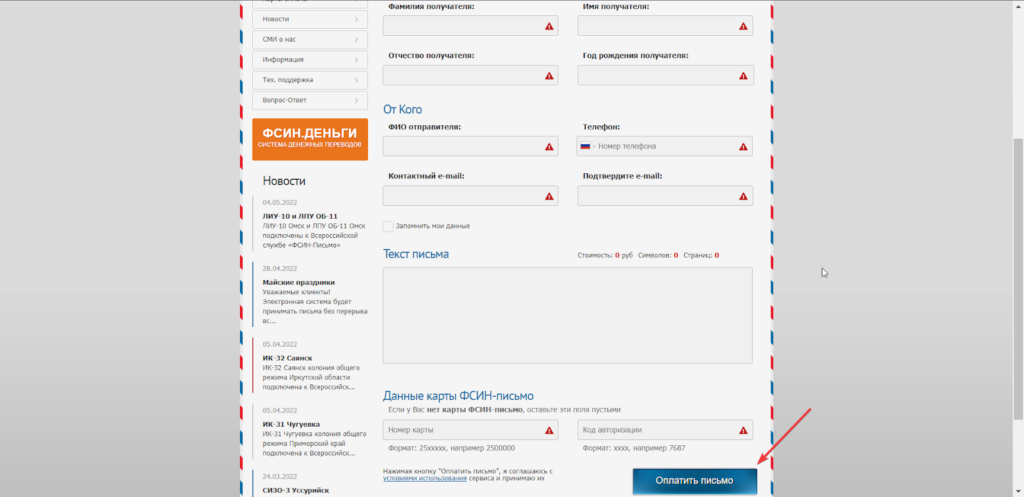Russian Canadian Democratic Alliance (RCDA) June 22, 2022
Is it safe to write letters to political prisoners?
Yes! It’s safe for you and for political prisoners. All human rights activists and organizations in Russia always encourage people to write letters to political prisoners – it supports them a lot.
Why do we need to write letters:
I am waiting for the letters. Yesterday [May 5] they came for the first time, I am writing answers to all of them. Write letters to political prisoners, they are like a breath of fresh air for us, like a thread that ties us to the will. Words of support inspire, give strength, and act as an incentive for self-development in such cramped circumstances.
Maria Ponomarenko,
detained for her anti-war activism.
What to write about
About nature, movies, books, travel, and a new job. It is important for a person in confinement to know the news, to get vivid emotions, and topics that can be discussed. It’s nice to receive cards sent from afar.
If you want to get a response, it’s worth asking questions to spark a discussion and get to know the person you’re talking to better.
Start with what you do in your normal life – introduce yourself, tell them about yourself. Talk about the movie you saw, or about a sunny morning, or about a flock of pigeons flitting by the subway, or how you got lost in a strange neighborhood.
As an inspiration or a helpful tool you can use this tool made by Belarusian activists: https://politzek.me/letter – it helps with the structure of a letter and gives some ideas on what you can write about. It is in Russian though, but your browser might help you with automatically translating the page. We encourage you to support Belarusian political prisoners as well (our instruction won’t be relevant though)!
What NOT to write about
About the circumstances of the criminal case. It can do harm. Remember that letters may end up with the investigator.
Your letter is sure to be read by the censor. Do not use:
- Information that may interfere with the establishment of the truth in a criminal case
- information conducive to the commission of a crime
- cipher or encryption
- state or other secrets protected by law
- foul language, insults or threats
- emoticons/emoji
- calls for extremism, terrorism, subversion of the constitutional order
- copies of any literary works*
- Rules of the Fsin-pismo (Rosuznik most likely uses it as well) forbid sending letters in foreign languages. Please use Google Translate or DeepL to translate your letter or ask for help from Russian-speaking activists**
*This rule exists, but in reality, it is not being followed – many people use quotations from literature in their letters and they reach prisoners without problems.
**If you would like to send a paper letter for example there might be an option to not translate it. According to the new rules, prisoners can receive letters in foreign languages - censorship will take longer due to the need for translation. But a lot will depend on the censor – they might not want to spend the time on translation at all. It doesn’t mean that your letter 100% won’t be delivered, but it might happen, so you might want to consider this. Also, it’s reasonable to write the letter in Russian first and ask if the person knows the language you want to write your next letter on.
The censor will paint over, cut out some parts of the letter or not give it back at all if they do not like something.
There is no explicit political censorship in pretrial detention centers and colonies – at least, not as a general rule. So you can write about what is happening in the country and the world and your own attitude to it.
You should not pity the prisoner, saying that “I dared not write to you for a long time” or “we are so worried” – it can be annoying. There is also the word “hang on”, which prisoners and their relatives do not like very much. Anarchist Alexei Sutuga’s mother Olga Nikolaevna always answered: “I’m not hanging on, I’m fighting.”
Before sending a letter, you can search for information about the person to see what you can talk to them about.
How to send a letter (two ways)
- RosUznik website: https://rosuznik.org/ – volunteer project, not related to the government. All the data you submit stays with the volunteers. The list of prisoners can be filtered by anti-war articles (anti-war protests, 207.3 (discrediting the army), arson of military recruitment centers). Choose someone from the list and send a letter – it’s very simple. You can attach pictures to the letter. If the prisoner replies to you, volunteers will send the letter to the email you left on the website. This way of sending letters is free, but we recommend donating some money to this volunteer project. You can send your donations to this paypal: post.rosuznik@gmail.com


- FSIN letter (FSIN-Pismo): https://fsin-pismo.ru/client/app/letter/create – “e-mail” service in the colony. The letter through this service is delivered to the colony via the Internet. The sensor reads it, prints it out, and brings it to the prisoner. Not all colonies are connected to this system. To send a letter, you have to go to the site, find the colony where your addressee is located, enter their full name and Date of Birth and write the text of the letter (the data of prisoners on the anti-war cases are listed below). For 2500 characters you have to pay 55 rubles + as much if you want to get a response. You can also attach a photo for 30 rubles each. Delivery and verification of the letter usually take about 3-4 days.
- If you have a Russian card to pay for the letter – you know what to do.
- If you don’t have a Russian card, you can use this initiative launched by the Russian diaspora in New Zealand and Australia: https://www.instagram.com/p/CeN7xEGhu_v/?igshid=YmMyMTA2M2Y%3D – after you fill in all the fields and write the text of the letter, click “Pay” (“Оплатить” – see the screenshot attached below). In a minute you will receive a letter from FSIN with the number, amount in rubles, the text of the letter, and a link for payment. This link should be sent to the email of the activists: politzek@yahoo.com – activists will pay for the letter using an open kiwi-money account. The invoice is valid for 30 days. You yourself count how many dollars your letter was and transfer the result to activists’ PayPal: politzek@yahoo.com (the same email address as above). After the invoice is paid and the FSIN receives the payment, you will receive a confirmation of payment from the FSIN letter.
- If you do not have a Russian card, but you are at the Evening of Letters to Political Prizoners – ask around, perhaps someone present at the event has a Russian card – then all that is described above, you can arrange on the spot.
- If you have a Russian card to pay for the letter – you know what to do.

In what cases is a person considered a political prisoner?
A person is considered a political prisoner if:
- The arrest violates the basic guarantees of the European Convention on Human Rights, especially the right to freedom of thought, conscience, religion, freedom of expression, and information, as well as freedom of assembly and association;
- The arrest is imposed solely for political reasons;
- The term or conditions of detention is not proportional to the gravity of the crime;
- The arrest is discriminatory in comparison to other persons;
- The imprisonment was the result of judicial proceedings that were manifestly unfair and politically motivated.
This document is based on the following sources:
- List of Political Prisoners – Memorial (Russian).
- List of political prisoners for their anti-war protest (Russian).
- Telegram Bot Svobot (Russian) – sends you the contact information of a random political prisoner, including those that have Birthdays soon.
- Antiwar Prosecutions: An OVD-Info Guide (English)
- Table with data from a wide variety of political prisoners (Project “Tales and Stories for Political Prisoners”) (Russian)
- Instruction from human rights organization OVD-info on how to write letters to political prisoners (Russian)
More info
- How to host a letter-writing to political prisoners event in your city – instruction by UznikOnline (Russian).
- How to host a letter-writing to political prisoners event in your city – instruction by Chernyi Fevral/Black February (Russian).
- https://en.ovdinfo.org/write-letters – OVD-Info service for people who don’t speak Russian and cannot translate through a translator.
- https://prisonmail.online/ – FSIN letter service for sending letters with payment via foreign cards.
